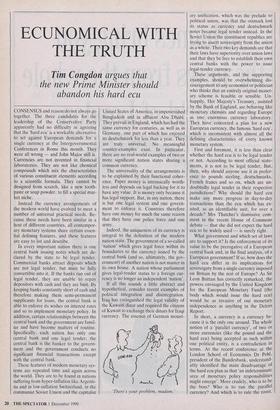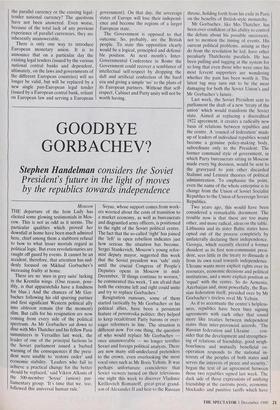ECUNOMICAL WITH THE TRUTH
Tim Congdon argues that
the new Prime Minister should abandon his hard ecu
CONSENSUS and reason do not always go together. The three candidates for the leadership of the Conservative Party apparently had no difficulty in agreeing that the 'hard ecu' is a workable alternative to set against European demands for a single currency at the Intergovernmental Conferences in Rome this month. They were all wrong — and John Major still is. Currencies are not invented in financial laboratories. They are not like chemical compounds which mix the characteristics of various constituent elements according to a scientific formula. They cannot be designed from scratch, like a new tooth- paste or soap powder, to fill a special mar- ket niche.
Instead the currency arrangements of the modern world have evolved to meet a number of universal practical needs. Be- cause these needs have been similar in a host of different countries, all contempor- ary monetary systems share certain essen- tial defining features, and these features are easy to list and describe.
In every important nation there is one central bank issuing notes which are de- clared by the state to be legal tender. Commercial banks attract deposits which are not legal tender, but must be fully convertible into it. If the banks run out of legal tender, they are unable to repay depositors with cash and they are bust. By keeping banks constantly short of cash and therefore making them semi-permanent supplicants for loans, the central bank is able to enforce its wishes on interest rates and so to implement monetary policy. In addition, certain relationships between the central bank and the government are famil- iar and have become matters of routine. Specifically, each nation has only one central bank and one legal tender; the central bank is the banker to the govern- ment and the government conducts no significant financial transactions except with the central bank.
These features of modern monetary sys- tems are repeated time and again across the world. They are to be found in nations suffering from hyper-inflation like Argenti- na and in low-inflation Switzerland, in the communist Soviet Union and the capitalist United States of America, in impoverished Bangladesh and in affluent Abu Dhabi. They prevail in England, which has had the same currency for centuries, as well as in Germany, one part of which has enjoyed its deutschmark for less than a year. They are truly universal. No meaningful counter-examples exist. In particular, there are no real-world examples of two or more significant nation states sharing a common currency.
The universality of the arrangements is to be explained by their functional coher- ence. Paper money is intrinsically worth- less and depends on legal backing for it to have any value. It is money only because it has legal support. But, in any nation, there is but one legal system and one govern- ment to enforce it. Countries therefore have one money for much the same reason that they have one police force and one army.
Indeed, the uniqueness of its currency is integral to the definition of the modern nation state. The government of a so-called `nation' which gives legal force within its boundaries to the currency issued by the central bank (and so, ultimately, the gov- ernment) of another nation is not master in its own house. A nation whose parliament gives legal-tender status to a foreign cur- rency is no longer an independent 'nation'.
If all this sounds a little abstract and hypothetical, consider recent examples of political integration and disintegration. Iraq has extinguished the legal validity of the Kuwaiti dinar and required the citizens of Kuwait to exchange their dinars for Iraqi currency. The essence of German monet-
'There's your problem, madam.'
ary unification, which was the prelude to political union, was that the ostmark lost its status as currency and deutschmark notes became legal tender instead. In the Soviet Union the constituent republics are trying to assert sovereignty from the union as a whole. Their two key demands are that their laws have superiority over union laws and that they be free to establish their own central banks with the power to issue legal-tender currency.
These arguments, and the supporting examples, should be overwhelming dis- couragement to any economist or politician who thinks that an entirely original monet- ary scheme is feasible or sensible. Un- happily, Her Majesty's Treasury, assisted by the Bank of England, are behaving like monetary chemists and regarding Europe as one enormous currency laboratory. They have concocted a plan for a new European currency, the famous 'hard ecu', which is inconsistent with almost all the defining characteristics of every known monetary system.
First and foremost, it is less than clear whether the hard ecu is to be legal tender or not. According to most official state- ments, it is not to be legal tender. But, then, why should anyone use it in prefer- ence to pounds sterling, deutschmarks, French francs and so on, which are un- doubtedly legal tender in their respective jurisdictions? Why should the hard ecu make any more progress in day-to-day transactions than the ecu which has ex- isted, as an identifiable unit, for over a decade? Mrs Thatcher's dismissive com- ment in the recent House of Commons debate — that she did not expect the hard ecu to be widely used — is surely right.
What government and which set of laws are to support it? Is the enforcement of its value to be the prerogative of a European central bank and, in the final analysis, of a European government? If so, how does the hard ecu differ in its implications for sovereignty from a single currency imposed on Britain by the rest of Europe? As Sir Leon Brittan has correctly remarked, the powers envisaged by the United Kingdom for the European Monetary Fund (the body which would issue the hard ecu) would be as invasive of our monetary independence as anything in the Delors Report.
In short, a currency is a currency be- cause it is the only one around. The whole notion of a 'parallel currency', of two or more currencies (like the pound and the hard ecu) being accepted as such within one political entity, is a contradiction 01 terms. At the recent conference at the London School of Economics Dr Pohl, president of the Bundesbank, understand- ably identified the main disadvantage of the hard ecu plan as that 'an indeterminate area of monetary policy responsibilities might emerge'. More crudely, who is to be the boss? Who is to run the parallel currency? And which is to rule the roost,
the parallel currency or the existing legal- tender national currency? The questions have not been answered. Even worse, because of the total lack of any previous experience of parallel currencies, they are inherently unanswerable.
There is only one way to introduce European monetary union. It is to announce that on a particular day the existing legal tenders (issued by the various national central banks and dependent, ultimately, on the laws and governments of the different European countries) will no longer be valid, but will be replaced by a new single pan-European legal tender (issued by a European central bank, reliant on European law and serving a European government). On that day, the sovereign states of Europe will lose their independ- ence and become the regions of a larger European state.
The Government is opposed to that outcome. So, probably, are the British people. To state this opposition clearly would be a logical, principled and defensi- ble position. At next month's Inter- Governmental Conference in Rome the Government could recover a semblance of intellectual self-respect by dropping the daft and artificial confection of the hard ecu and giving a simple 'no' to the plans of its European partners. Without that self- respect, Cabinet and Party unity will not be worth having.











































































 Previous page
Previous page